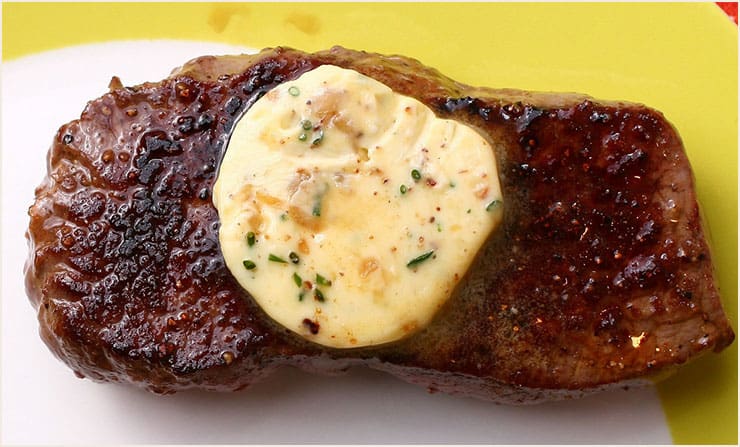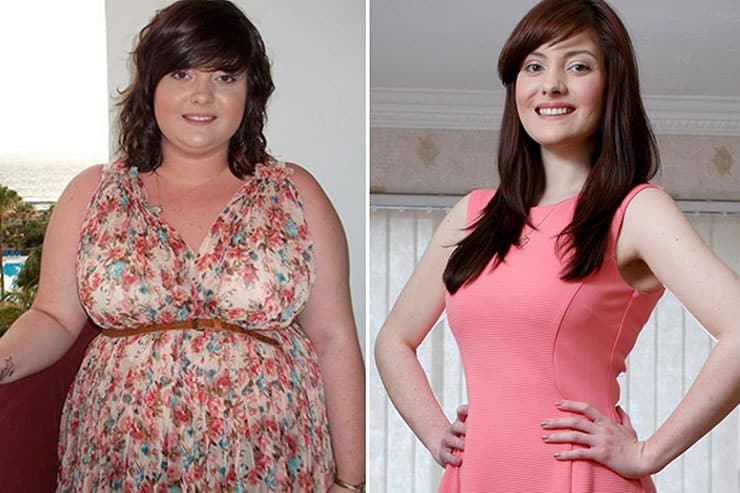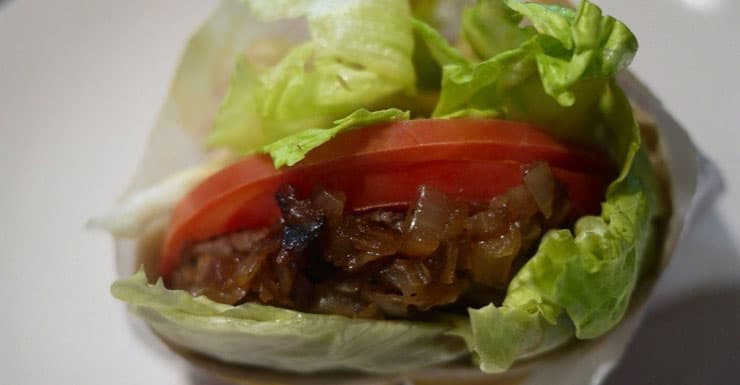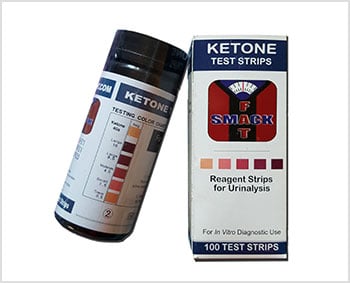The Ketogenic Diet
You might not have heard of the ketogenic diet yet, but you will! Also called the Keto Diet, this diet is a very low carb, moderate protein and high fat diet. The plan calls for 75 percent fat, 20 percent protein, and only 5 percent carbohydrates each day. This equates to about 20 grams of carbohydrate.
If you want to know what your macros should be, use our keto calculator to find your exact numbers for weight loss.
RELATED ARTICLES
- NEW Top 10 Delicious Ways To Make A Burger WITHOUT Bread
- Start Keto With These 15 Keto-Friendly Meals
- 15 Indulgent Keto Desserts (under 5grams of carbs)
- 10 Keto Friendly Infused Water Recipes
- New To The Keto Diet? Here’s How to Get Started
- Top 10 Keto Kitchen Essentials
- 3 Ways To Measure Your Ketones
 The Ketogenic Diet is a very low carb, moderate protein, high fat diet. The plan calls for 75 percent fat, 20 percent protein, and only 5 percent carbohydrates each day.
The Ketogenic Diet is a very low carb, moderate protein, high fat diet. The plan calls for 75 percent fat, 20 percent protein, and only 5 percent carbohydrates each day.
What Is The Ketogenic Diet?
The ketogenic diet is similar to the Atkins diet, in that it involves drastically cutting back on carbohydrates, and replacing it with fat and protein. This reduction in carbs will put your body into a state called ketosis. Ketosis makes your body a super fat burning machine!
This plan is so popular; it seems as if everyone in Hollywood is on this diet! Megan Fox, Mick Jagger, Adriana Lima, and, most notably, Kim Kardashian, who claims she easily lost all her baby weight by following this eating plan.
If you are interested in getting started, this article spells out how you can get your diet underway.
You will probably find this diet to be a complete 180 of what so called "experts" have been telling people for years. The ketogenic diet involves eating healthy fats and plenty of them! In fact, you should be getting about 70-80% of your calories from healthy sources of natural fat.
What is Ketosis
Ketosis is a physical condition in which the body temporarily has elevated levels of compounds known as ketone bodies in the fluids and tissues.
While our body normally gets the majority of its energy by changing carbs into simple sugars and storing these glycogens in the liver and muscles, what happens when the body is deprived of glucose? When this occurs, the body breaks down fat for energy. When the liver metabolizes these fatty acids, it produces ketone bodies, which are loaded with energy.
What all this scientific talk means is that the body has two basic forms of energy, glycogen or fat. The body needs energy to function. It will first use glycogen from simple sugar type foods (carbohydrates) and then it switches to burning fat.
The Ketogenic diet forces the body to use fat as its source of energy because you will be denying it carbohydrates as a source of food.
This means you can think of the Ketogenic diet as a switch, which turns your body into a fat melting furnace, 24/7. This article tells you how you can tell that you are in a state of ketosis and this article will tell you how to get into a state of ketosis in 72 hours or less!
The Ketogenic diet will cause your body to use fat as its main source of fuel. Insulin levels drop dramatically, which causes fat burning to increase just as dramatically.
Want to know more about how you can increase your ketone levels? This article spells things out in an easy to understand format.
Health Benefits
Does the keto diet offer other benefits besides weight loss?
 The Ketogenic diet can help with much more than just weight loss
The Ketogenic diet can help with much more than just weight loss
You will find that there are a great many benefits to a low carb diet; weight loss just happens to be one of them. Although not all of the following apply to everyone, many find that they receive at least one or two of the following benefits:
- Major Improvement in Type 2 Diabetes: A low carb diet will dramatically lower blood sugar levels. This is a fact. Lower blood sugar levels mean lower insulin levels. Many people find that they can reduce their insulin dosage after just a few days on the keto diet. Speak to your doctor before changing your medications.
- It Lowers Your Risk of Heart disease: The keto diet will raise the good type (HDL) of cholesterol in the body and lower those dangerous triglycerides, which will dramatically lower your risk of heart disease.
- Lower Blood Pressure: High blood pressure can lead to a variety of problems, including stroke, kidney failure, and heart disease, to name a few. Low carb diets often reduce blood pressure, helping you to live a longer, happier life.
- Improvement for Brain Disorders: These include ALS, Multiple Sclerosis, and Parkinson’s Disease. Low carb diets similar to the Ketogenic diet have been used for several decades to help treat children with epilepsy One study found that more than half of children who were put on a ketogenic diet had 50% fewer seizures and a full 16 percent became completely seizure free.
- Improvement in PCOS: Many women with polycystic ovary syndrome also suffer from insulin resistance. A low carb diet, such as the keto diet, addresses the insulin resistance problem, thereby taking care of one of the roots of this problem, which often leads to infertility.
- Most of the Fat Lost is Abdominal Fat: While no one likes a pooch belly, the truth is that fat around the middle is different from other types of fat. This type of fat is called visceral fat and it tends to park itself around the internal organs, which can lead to metabolic syndrome and other health problems. Most people find that the keto diet removes that stubborn spare tire!
The bottom line here is that the ketogenic diet is a powerful tool for treating a wide range of illnesses, especially metabolic issues and type 2 Diabetes.
You can find more information about the health benefits of the keto diet here.
Is the Keto Diet Dangerous?
Let's correct a few misunderstandings about what the keto diet is and isn’t:
1. Keto isn’t Ketoacidosis
Many people confuse the words ketogenic and ketoacidosis. Ketogenic or being in a state of ketosis is perfectly natural and normal. Most people begin to go into a state of ketosis when they stop eating before bedtime and before they eat breakfast.
Ketoacidosis is NOT normal or natural and it doesn't happen to you because you stop eating carbs or stop eating. Ketoacidosis occurs when the body does not make enough insulin, pulls fat from the cells of the body, and keeps the blood sugar levels high. This is a combination for disaster and requires a doctor to administer insulin.
Ketosis is regulated by insulin. Your body will make insulin to handle your needs, if it doesn’t, you have a more serious health problem and need to be under a doctor’s care.
2. Won’t high fat clog my arteries?
This is perhaps the biggest myth of them all! After years of being told that eating fat will make us fat and clog up the arteries, the truth is that there is no scientific evidence to back this up. Really. Don’t believe us, check out this meta-analysis (1) from 2010.
3. Won’t my kidneys be damaged from high protein consumption?
A high protein diet MIGHT damage your kidneys, but since the ketogenic diet is a high fat diet, not a high protein diet, you have nothing to worry about. You can check out this study (2) for more info.
4. Aren’t carbs necessary for the body?
This is an old school myth that simply won’t die. While it's true that there are some things the body cannot make on it’s own, carbs isn’t one of them. You’ve probably heard of essential amino acids and essential proteins, but when have you ever heard of essential carbohydrates? You haven't because there are none. The brain works just fine on ketones, and the body works even better. If your body truly needs carbs, the liver can make them for you.
What Foods Can I Eat?
You should base the majority of your meals around the following foods:
- Meat: Beef, steak, ham, pork, sausage, bacon, chicken and turkey.
- Fatty fish: Such as salmon, trout, tuna and mackerel.
- Eggs: Look for pastured (organic or free range) or omega-3 whole eggs.
- Butter and cream: Look for the words grass fed or organic and choose those products whenever possible.
- Cheese: Unprocessed cheese (cheddar, goat, cream, blue or mozzarella).
- Nuts and seeds: Almonds, walnuts, flaxseeds, pumpkin seeds, chia seeds, etc.
- Healthy oils: Primarily extra virgin olive oil, coconut oil and avocado oil.
- Avocados: Whole avocados or foods made from avocados, such as home-made guacamole.
- Low-carb veggies: Most green veggies, tomatoes, onions, peppers, etc. Think vegetables grown above ground, not those grown below ground (in most cases) such as potatoes or turnips.
- Condiments: You can use salt, pepper and various healthy herbs and spices. Read labels when it comes to items such as BBQ sauce, hot sauce, ketchup, teriyaki sauce, mayo, and even mustard as some contain unwanted sugar.
Think natural and whole foods, rather than relying on processed or frozen foods.
For a full list of keto friendly foods, check this out.
What Food Should I Avoid
Otherwise, you should avoid the following foods:
- Sugar (including things like sodas, fruit juice, and ice cream)
- Wheat based products, even whole grains, including rice and cereal
- Fruit (other than very small portions like blueberries or strawberries)
- Beans
- Root vegetables and starchy vegetables such as potatoes and corn
- Unhealthy fats such as mayo and processed oils such as corn or canola oil (vegetable oil)
- Alcoholic beverages
Otherwise, feel free to eat as much as you like of just about everything else! This includes food like butter, cream, cheese, milk, eggs, fish, all types of meat, including bacon, nuts, seeds, olive oil and avocado oil, veggies (with the exception of those listed above) and condiments such as mustard, garlic, and more.
What Can I Eat When I’m at Restaurants Or Other Places?
 Keto friendly bunless burger
Keto friendly bunless burger
One of the aspects of this eating plan that most people find really attractive is that you can always find something to eat that is keto friendly, no matter what type of restaurant you might be going to!
Here for some terrific ideas and tips for eating out on Keto.
Will I Lose Weight?
Oh yes! Numerous studies (3) show that that diet is so filling and satisfying that you can lose weight even if you don't track calories or weigh your food.
Other studies (4) have found that those on the keto diet lose 2.2 times more weight than those on low fat or calorie restricted diets!
If you find that your ketone levels are low, read this article to find out why and how to fix the problem(s).
In addition to losing weight, however, this diet has been shown to help prevent heart disease, lower the risk of cancer, reduce Alzheimer’s and Parkinson’s disease, minimize acne breakouts, and even lower the number or severity of epileptic seizures!
Why Am I Not Losing Weight On The Keto Diet?
While most people lose weight on this type of eating plan, there are a few people who seem to have trouble with it. The following is a short list of reasons why you might not be losing weight:
- Eating too much fruit (Limit yourself to no more than 1 piece or 1 handful each day)
- Eating too much dairy (or low- fat dairy) Dairy counts as protein, so limit your daily consumption.
- Lack of sleep (the body needs sleep to replace hormones and regulate metabolism)
- Eating too many carbs (Whatever number of grams you are consuming, cut back by 10 grams and see if it helps)?
- Too much caffeine (Caffeine stimulates the body to make glucose)
- Hidden sugar in the diet (Read all labels on everything!)
If you find that you are not losing weight, read this article to find out why and how to fix the problem(s).
The Advantages
Eating as much as you like of the foods that are allowed is a big plus. No more need to worry about hunger pangs!
This diet plan will cause you to lose dramatic amounts of weight, even if you don’t get much exercise.
The foods are very satisfying and leave you feeling full.
There are many, many advantages to the Keto plan. For complete list, check out this article.
The Disadvantages
It can be expensive, since most meal fillers, such as bread, rice, and beans will be eliminated. Meat is definitely more expensive than bread.
Some people become bored and long for comfort foods (carbs).
Sample Diet Plan
Remember that if you are hungry, you can eat as much as you like of the foods you are allowed to eat. This is why we don’t mention portions in this section:
- Breakfast: Bacon, scrambled eggs with onions and tomatoes
- Snack: Yogurt
- Lunch: Cheeseburger (minus the bun), salad with full fat Ranch dressing
- Snack: Popcorn with butter
- Dinner: Fried pork chops, steamed broccoli with butter
- Snack: Handful of nuts or celery with guacamole
The snacks listed here are pretty basic. For a better list of snacks, click here.
Will I Need Supplements?
While no one technically needs supplements, there are a few that will greatly help your efforts and prevent what is known as “the keto flu” or “the low carb flu”. You can read more about the recommended supplements here.
Do I Need to Buy Anything Special?
One of the best things about the keto diet is that you don’t have to buy any special foods or equipment. In fact, the more natural your diet is, the better it will work for you. Avoid those frozen meals or “low carb” snacks. They are not what they claim to be, in most cases.
 Smackfat Ketone Strips - darker shades indicate progressively larger amounts of ketones detected
Smackfat Ketone Strips - darker shades indicate progressively larger amounts of ketones detected
However, since you are going to be spending more time prepping your meals and cooking, there are a few items that will make you life easier in this area. Check out some of the suggested items for a keto kitchen that will make cooking and prep time a breeze!
You will probably want to check your ketones to be sure that you are on the right track. You can read all about testing, the best methods, and how to do it in this article.
The Bottom Line
For those who need to lose a large amount of weight, this diet plan is perfect for fighting hunger and producing feelings of satiety. If you love pasta and bread, you might find this diet difficult to live with.
Using the Ketogenic Diet long-term can result in significantly reduced BMI and overall better cardiovascular health (5).